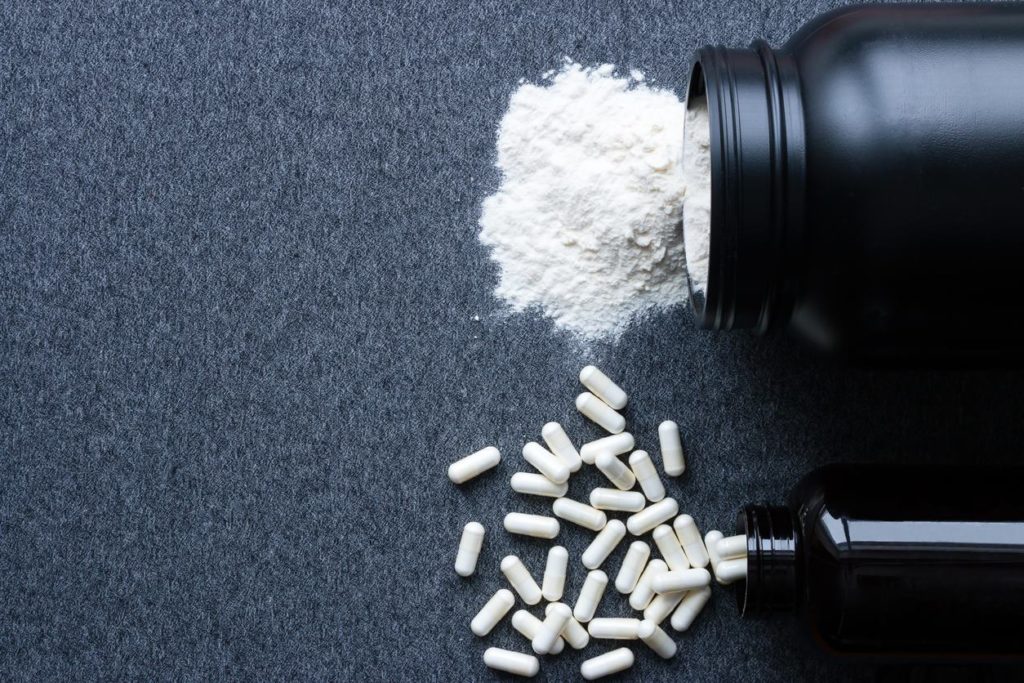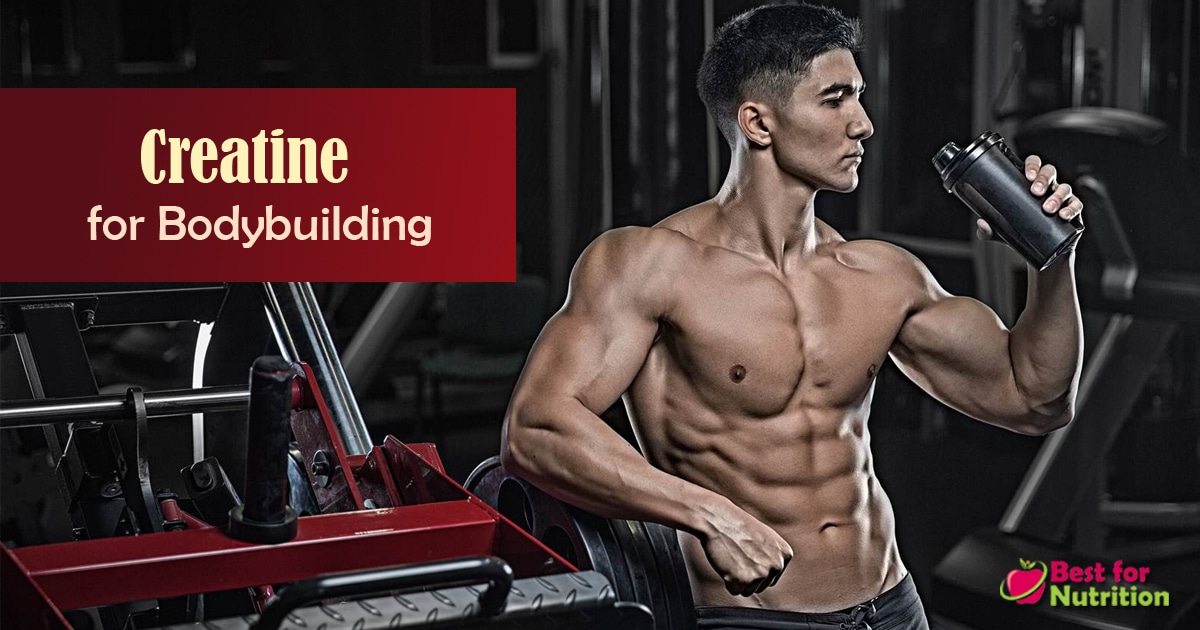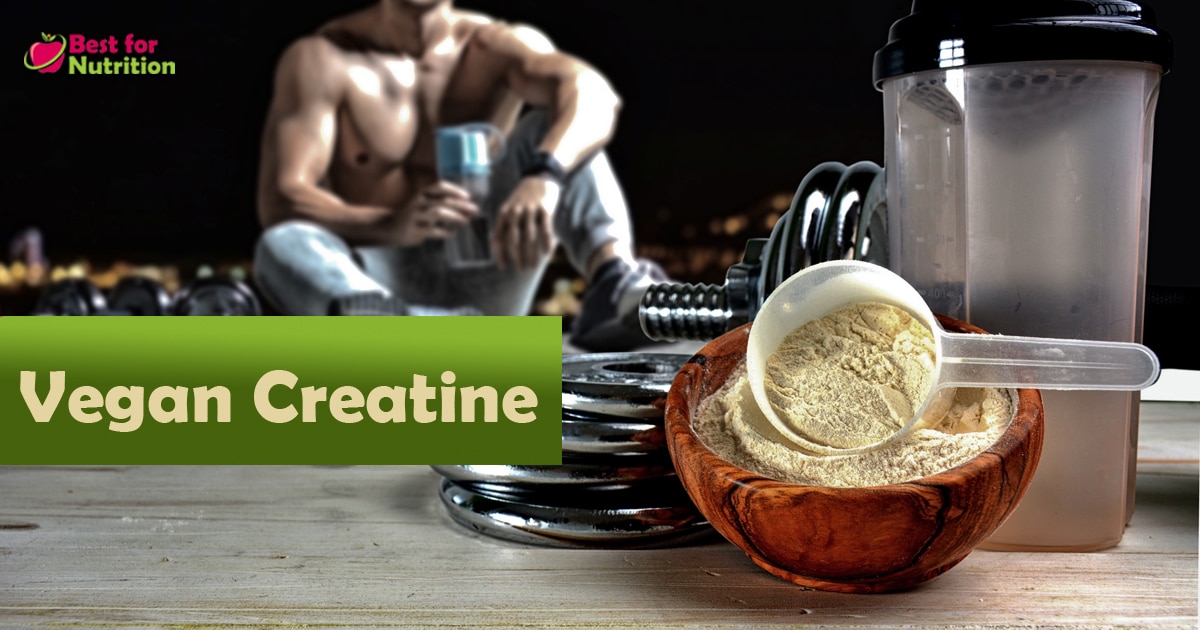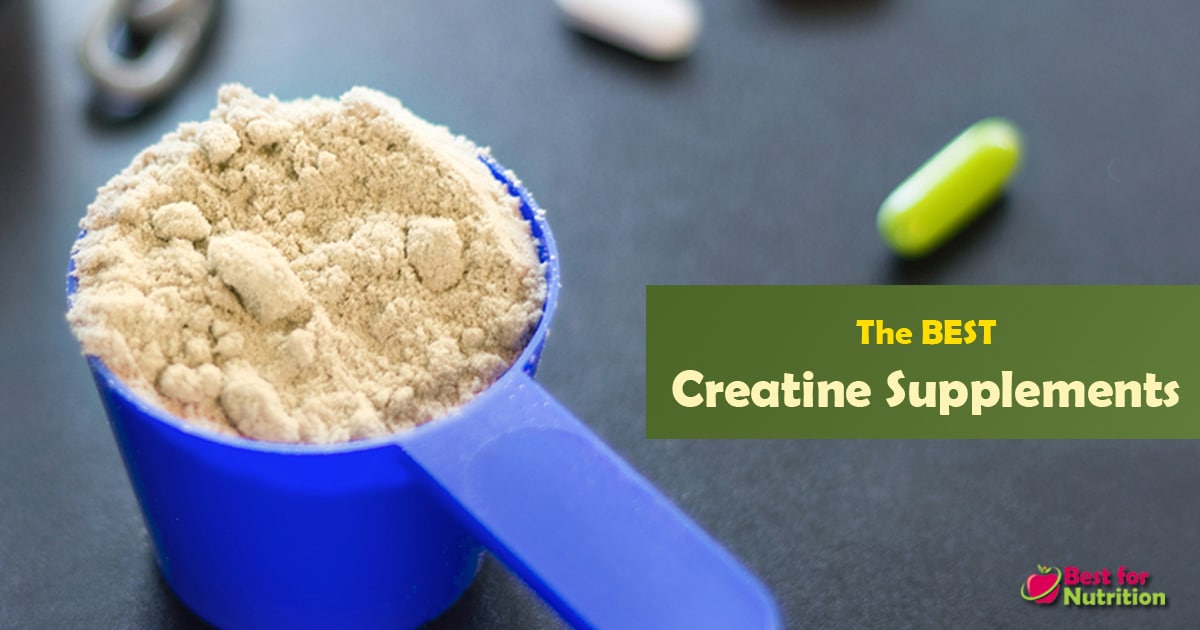As a bodybuilding supplement, creatine is fast gaining popularity. It is believed to boost muscle strength and lean muscle mass. It also seems to help muscles recover faster during exercise.
Creatine seems especially beneficial for boosting energy and performance in short duration, high-intensity workouts such as sprinting or weight lifting.
While some claims regarding the benefits of creatine may prove to be just wishful thinking, it does offer multiple health benefits to those wishing to enhance their physical fitness.
What is Creatine?

Creatine, a natural substance found in the human body, is derived from the Greek word ‘kreas’, meaning flesh or meat. The discovery of creatine can be traced back to 1832 when Michel Eugene Chevreul, a French chemist, managed to extract the compound from meat.
About 95% of the creatine is stored and used by the muscles. The liver, kidneys and to a minimal extent the pancreas, produce and use 5% of the creatine and the balance is procured through a good diet that supplies both essential and non-essential amino acids.
Sometimes, the creatine used by the body is not easily replenished even through a good diet and there arises a need for additional creatine through exogenous supplements.
Everyone can get creatine naturally by consuming meat, but athletes and physically active people may still lack enough creatine, as they use up more creatine owing to intense training. Such people benefit more from adding supplements to their daily diet.
Vegetarians or vegans also may require supplements simply because their natural diets may not provide adequate creatine.
Why Do We Need Creatine?
Creatine is essential for every human being and the human body produces it using 3 amino acids, arginine, glycine, and methionine. Though enough quantities are made to manage daily activities, creatine is used more rapidly by the muscles as energy to fuel intense physical activity requiring repeated strength and stamina such as sports.
Creatine, when consumed with complex carbohydrates, can raise glucose levels and increase better absorption. Creatine provides energy reinforcements to muscles and replenishes the ATP levels during intense workouts. ATP or adenosine triphosphate, an energy-transporting molecule that fuels all the cells in the body.
Physical exercise depletes ATP levels and creatine aids in increasing the phosphocreatine reserves to restore ATP levels back to normalcy. This helps sustain energy, strength, and stamina during exercise, enhancing performance and longer durations of training.
Though many types of creatine are in use, the most often-used type is creatine monohydrate, which has been accepted as reliable and effective by the International Society of Sports Nutrition (1).
Creatine monohydrate is derived by the binding of creatine to one molecule of water. This property helps to retain moisture in the cells to prevent muscle protein breakdown and aid in better protein synthesis.
13 Proven Health Benefits of Creatine
Creatine has been backed by plentiful studies as well as organizations such as the International Society of Sports Nutrition as safe and effective for providing overall health benefits besides supporting muscle growth and energy. Listed are some of the proven health benefits of creatine supplementation.
Increased Body Mass
Creatine supplementation can be effective in enhancing body mass in the body. Initially, creatine draws water into the muscle cells causing an increase in muscle mass. This also results in increased body weight. However, over time with constant workouts, there is a significant increase in creatinine concentrations and muscle mass (2).
Studies have shown that even short-term creatine supplementation can result in some changes in body composition and lead to an increase in lean body mass (3).
Creatine works by changing certain cellular pathways to boost protein concentration to promote new muscle fibers (4).
When combined with resistance training, creatine supplementation has shown the capability to reduce serum myostatin to induce better muscle growth and mass (5).
Specific studies indicate that creatine, when combined with regular strength-training, can enhance satellite cell number and myonuclei concentrations in the skeletal muscles for improved muscle growth (6).
Summary: Creatine supplementation is beneficial to increase creatinine concentrations, alter cellular pathways to facilitate the proliferation of new muscle fibers and reduce myostatin to increase muscle growth and lean body mass.
Improves Athletic Performance
Creatine is commonly used in sports-related activities as it has shown to aid high-intensity training with efficacy. Creatine supplement is proven by research to be useful in short, high-intensity bouts of exercise (7).
The International Society of Sports has noted that:
“Creatine monohydrate is the most effective ergogenic nutritional supplement currently available to athletes in terms of increasing high-intensity exercise capacity and lean body mass during training” (8).
Studies have shown that creatine can promote strength, fat-free mass, endurance, and enhance exercise performance in high-intensity tasks with the exception of swimming and running (9).
Creatine can be effective in improving the performance in repeated sprint runs in handball players; increasing muscular performance in repeated sets of bench press and jump-squat exercise and better strength during arm-flexor strength training (10), (11).
Summary: Creatine has been effectively supporting sports as an ergogenic supplement to enhance performance, muscular strength in high-intensity training but also aid in faster muscle recovery from injuries.
Creatine Increases Phosphocreatine Levels for ATP Synthesis
Phosphocreatine (Pcr), also called creatine phosphate are high-energy phosphate molecules that act as quick reserves for recycling and maintaining ATP reserves in the muscles. Creatine supplements are phosphorylated to phosphocreatine in muscles catalyzed by creatine kinase, an enzyme (12).
Creatine has the capability to expand phosphocreatine stores in the muscle areas. This, in turn, helps maintain ATP levels to constantly fuel energy into cells during heavy workouts.
Studies have shown that daily ingestion of 4 doses of creatine for just 5 days can increase phosphocreatine concentrations to maintain ATP synthesis for more energy (13).
Studies have revealed that creatine supplementation can result in different levels of phosphocreatine in young and old people (14).
Another study showed that creatine increased Phosphocreatine levels for ATP synthesis to enhance performance during handgrip exercises (15).
Summary: Creatine supplementation can effectively increase the phosphocreatine levels which in turn accelerates ATP synthesis to provide energy for cells during intense workouts.
Creatine Aids in Faster Recovery Post-Workouts
Muscle injuries and soreness are common effects of high-intensity workouts. Creatine has been proven to lower muscle damage and accelerate muscle recovery in athletes and other sportspersons.
Research has shown that creatine is able to support faster recovery from injuries caused due to eccentrically-induced muscle damage (16).
Specific studies have revealed that creatine supplementation can support rehabilitation of young swimmers in injuries due to tendon overuse (17).
Another study indicated that supplementation of creatine could reduce inflammation and muscle soreness and inflammation after an exhaustive 30km race (18).
Generally, various studies have affirmed that dietary supplementation of creatine can help prevent/ reduce muscle damage and aid in faster recovery post-high-intensity workouts in sports (19).
Summary: Numerous studies support the fact that creatine can effectively aid in reducing muscle damage, inflammation and soreness and support faster rehabilitation and recovery post intense training.
Creatine May Aid in Muscular Dystrophy
Muscular Dystrophy refers to a genetic group of diseases that cause progressive muscle weakness and loss of muscle mass over time. Genetic mutations can cause interference in the production of certain essential muscle proteins that aid normal muscle functions.
Absence or lack of these proteins can affect motor coordination, swallowing, walking, etc. Creatine has been at the forefront for studies on aiding muscle strength and mass has been proven to help in muscular dystrophy as well.
Some studies have shown that short-term creatine supplementation may increase muscle strength and have positive effects on functional performance in muscular dystrophies (20).
Another specific study showed that though phosphocreatine levels did not seem to change in patients with muscular dystrophies, there was a significant change in the quantitative muscle power after subsequent creatine supplementation (21).
Certain studies have shown that creatine supplementation can be effective in helping improve muscle performance and provide symptomatic improvements in children with Duchenne muscular dystrophy (22), (23).
Summary: Creatine supplementation in conditions of muscular dystrophy has been proven beneficial to increase muscle strength in adults and provide symptomatic improvements and muscle performance in children.
Creatine May Aid in Treating Parkinson’s Disease
Parkinson’s disease is a progressive disorder of the central nervous system, occurring due to damage to nerve cells that cause dopamine levels to drop affecting movement drastically (24).
Animal studies have shown that creatine enhances phosphocreatine levels which help ATP depletion and thereby exert neuroprotective capabilities and when taken in combination with Coenzyme Q 10 is effective in the treatment of Parkinson’s disease (25), (26).
Studies on creatine have indicated that it has displayed neuroprotective properties that may be beneficial in treating neurodegenerative disorders such as Parkinson’s or Huntington’s disease (27).
One particular study showed that creatine supplementation improved better resistance training benefits in patients with Parkinson’s disease (28).
Summary: Creatine with its neuroprotective properties may help in the treatment of Parkinson’s disease and can show better benefits when combined with resistance training.
Creatine May Help Fight Neurological Diseases
World Health Organization (WHO) statistics state that neurological disorders affect millions of people globally. Neurological diseases are classified as those that affect the central or peripheral nervous system of the human body such as the brain, spinal cord, peripheral nerves, muscles, etc. Some of the common disorders are Alzheimer’s, Parkinson’s disease, brain tumors, epilepsy and disorders caused by head trauma (29).
Creatine with its neuroprotective capabilities may prove beneficial in fighting certain other neurological conditions. A number of animal studies with creatine have portrayed its potential in the treatment of a variety of conditions such as Alzheimer’s, Ischemic stroke, spinal cord injury, etc (30), (31).
Studies have shown that creatine can display anticonvulsant effects in epilepsy seizures (32). Creatine can be beneficial for ALS, a disease that affects motor neurons (33).
Summary: Studies have focussed that creatine may have properties to help in the treatment of neurological diseases but more studies are required to determine the efficacy of creatine in other neurological conditions and in humans.
Creatine Can Help in Treating Depression
Depression, a mood disorder, affects more than 250+million people globally and can significantly impact daily life. Creatine is thought to help in relieving some symptoms of depression and studies have been undertaken for the same.
A particular study showed that creatine can be therapeutically effective in females with lower phosphocreatine concentration and prescribed methamphetamine for depression (34).
Creatine supplementation in women with a major depressive disorder also showed improvement with rapid responses as early as 2 weeks from the time of supplementation (35). According to one specific study, creatine supplementation may help in unipolar depression but may initiate maniacal symptoms in people with bipolar disorder (36).
Summary: Creatine supplementation can help relieve symptoms of depression especially in women with major depressive order.
Creatine May Boost Cognitive Ability
Cognitive ability refers to mental capabilities such as reasoning, planning, logical thinking and problem-solving skills of a human being. Creatine can play a crucial role in enhancing brain health and promoting cognitive abilities in humans.
Numerous studies have indicated that creatine supplementation can enhance mental health and even protect from traumatic brain injury (37). Studies have shown that creatine supplementation can enhance working memory and intelligence to improve performance (38).
In the elderly, creatine helped with random number generation, spatial recall, and long-term memory tasks with better precision (39). Creatine supplementation in healthy young individuals can increase short-term memory and reasoning abilities (40).
Summary: Creatine supplementation has shown to boost working memory and reasoning abilities in young individuals. It helps with spatial memory in elderly persons and even aids in preventing traumatic brain injury.
Creatine May Have Cardioprotective Effects
Cardiovascular diseases (CVD) are disorders that affect the heart and blood vessels and are considered to be the number 1 cause of death globally, according to WHO. Creatine combined with specific kinds of workouts or training can help protect against risks of cardiovascular conditions.
Studies have shown that creatine, when combined with resistance training, can lower homocysteine levels, which can create cardiovascular risks such as heart attacks or strokes (41).
Other studies have revealed that creatine supplementation in people with chronic heart failure had a positive impact on skeletal muscle phosphagens and performance (42).
Another study showed that creatine could potentially increase both body weight and muscle strength in persons with congestive heart failure (43).
Research has also proven that creatine monohydrate supplementation in physically active young adults improved microvascular reactivity and showed a considerable increase in skin capillary density (44).
Summary: Creatine in combination with physical exercise has been proven by studies to exert cardioprotective properties by lowering homocysteine levels. Positive impact on weight, muscle strength and performance has also been noticed in people with conditions of heart failure.
Creatine Can Improve Bone Density
Bone density refers to the mineral density in your bones that indicates a risk of fractures and osteoporosis, Creatine when combined with regular workouts has shown to strengthen bones and enhance bone mineral density to maintain good bone health.
Studies have shown that creatine supplementation combined with resistance training can help increase bone mineral density in older men (45).
Creatine can also aid post-menopausal women with enhanced bone health (46). Research suggests that creatine supplementation might have a positive impact to prevent age-related bone loss and reduce the risk of injuries or fractures (47).
Summary: Creatine supplementation as studies have shown indicates that it is capable of preventing bone loss and when combined with resistance training can increase bone mineral density in aged men and post-menopausal women.
Creatine May Help in Regulating Blood Sugar
Blood sugar or glucose is the amount of sugar in your blood. Glucose is essential for energy but an excess of it can lead to Diabetes, a condition where the body is unable to use the excess glucose, which in turn is harmful to the body.
Various studies have indicated that creatine can play an important role in regulating glucose metabolism (48).
Studies have shown that creatine supplementation can enhance factors to regulate GLUT4 transporter responsible for transporting glucose into skeletal muscles (49).
Further studies also revealed that prior creatine supplementation could have a positive effect on the muscle’s glycogen-loading capacity and could increase cell volumes greatly (50).
Research also suggests that creatine ingestion by sedentary males combined with anaerobic exercises can influence glucose tolerance but not insulin sensitivity (51).
Summary: Studies show that creatine supplementation can regulate the body’s glucose metabolism by controlling the GLUT4 transporter and glycogen-loading capacity in the muscles and influence tolerance levels through anaerobic training.
Creatine May Help Combat Mental Fatigue
Creatine has been known to aid in providing muscular strength for enhanced performance by increasing phosphocreatine levels for ATP synthesis. This along with its neuroprotective abilities is thought to contribute to treating chronic fatigue.
In a certain study, creatine was shown to reduce mental fatigue when subjects repeatedly performed mathematical calculations (52).
Another study showed that a low dosage of creatine enhanced fatigue resistance in high-intensity training (53).
In children and adolescents with traumatic brain injury, creatine helped to reduce headaches, dizziness, and fatigue in all patients (54).
College-aged women who took creatine loading for 5 days showed a significant delay in the onset of neuromuscular fatigue while performing a cycle ergometry test (55).
Summary: Creatine supplementation can help lower mental fatigue in lower doses and neuromuscular fatigue when taken as a loading phase.
The Dosage of Creatine Supplements
Sportsmen and fitness enthusiasts can take creatine doses in two phases; loading and maintenance. Though the loading phase is not 100% important, it can provide better gains if used correctly.
During the loading phase, more quantities of creatine are taken to increase creatine levels rapidly. This helps shorten the timeline to see actual results.
The loading phase allows maximum absorption of creatine as reserves to prevent faster depletion during training. Ignoring a loading phase means more time is required to saturate the creatine reserves completely. The loading phase is quite a short period and lasts for 5 – 7 days.
Then comes the maintenance phase where a daily dose of creatine is taken to sustain creatine levels in the body. The approved and recommended doses of creatine in scientific studies are: (56)
- Loading Phase: 20 grams a day consumed as 5 grams 4 times a day up to 7 days. Another ideal calculation formula is 0.3 grams per kg per day
- Maintenance Phase: 5 grams per day for 4 – 6 weeks
Choosing oral supplements is a great way of adding creatine to your diet effectively. But exercise caution to make sure you don’t end up ingesting too much at once. Some supplements with a combination of ingredients can have slightly different dosages.
Be aware of side-effects and read the accompanying literature with the pack to ensure you avoid high dosing of creatine.
Creatine works best when consumed with food rather than on an empty stomach. Plus, staying hydrated with a good intake of water will prevent dehydration and gastric trouble due to the consumption of creatine.
The Risks and Side-effects of Creatine Supplements
Creatine is deemed to be quite safe and there are enough scientific studies to back that. Even long-term supplementation taken in clinically approved dosages does not cause adverse effects (57).
Still, it is wise to exercise caution as increased doses of creatine can cause gastrointestinal distress and diarrhea (58). Creatine can interfere with certain medications and a physician’s advice should be taken before starting a creatine supplement.
A common so-called side-effect that seems alarming is seen as soon a one commences creatine supplementation is that of weight gain. This weight gain is because of creatine ability to accumulate water in the muscle cells.
Creatine intake should be stopped or intake reduced to a lower dosage if one experiences symptoms such as muscle cramps, irregular heart rate, dizziness, seizures, allergic reactions or if one has medical conditions such as blood pressure, liver or kidney disorders (59).
Pregnant, nursing women, children and those under prescribed medications should avoid creatine as there are no supportive studies to vouch for their safety in consumption.
The Final Note
Creatine, an organic substance produced by our body, is vital for providing energy and maintaining muscle strength. Capable of being manufactured through daily diets that contain meat, creatine aids in replenishing ATP levels that get depleted during physical exercise. Athletes and sports persons may require more creatine for intense workouts, hence the need for supplements.
Creatine supplementation in small clinically-approved dosages is proven safe and supported by various studies. It also provides numerous health benefits to our body such as improving body mass, strength, performance, increase recovery rate after training and exerts cardioprotective and neuroprotective effects to help with neurological conditions.
Side-effects are very minimal and exercising caution to prevent high-dosing can make creatine an ideal dietary supplement that benefits overall physical and mental health and well-being.





